-
 Bitcoin
Bitcoin $76,444.7530
-3.77% -
 Ethereum
Ethereum $1,473.8355
-5.46% -
 Tether USDt
Tether USDt $0.9991
-0.08% -
 XRP
XRP $1.7965
-5.51% -
 BNB
BNB $553.4919
-0.36% -
 USDC
USDC $0.9999
-0.02% -
 Solana
Solana $105.2981
-1.74% -
 TRON
TRON $0.2303
0.81% -
 Dogecoin
Dogecoin $0.1422
-4.62% -
 Cardano
Cardano $0.5587
-4.41% -
 UNUS SED LEO
UNUS SED LEO $8.9866
1.01% -
 Toncoin
Toncoin $2.9933
-4.74% -
 Chainlink
Chainlink $10.9113
-4.81% -
 Stellar
Stellar $0.2215
-4.76% -
 Avalanche
Avalanche $16.1163
-3.29% -
 Sui
Sui $1.9371
-3.89% -
 Shiba Inu
Shiba Inu $0.0...01065
-6.69% -
 Hedera
Hedera $0.1469
-3.29% -
 MANTRA
MANTRA $6.2058
-1.53% -
 Dai
Dai $1.0000
0.01% -
 Bitcoin Cash
Bitcoin Cash $269.3457
-2.08% -
 Polkadot
Polkadot $3.3773
-5.87% -
 Litecoin
Litecoin $69.2204
-2.50% -
 Ethena USDe
Ethena USDe $0.9986
-0.01% -
 Bitget Token
Bitget Token $4.0180
-3.25% -
 Pi
Pi $0.5649
-4.50% -
 Hyperliquid
Hyperliquid $11.1928
-2.80% -
 Monero
Monero $195.3885
-4.41% -
 OKB
OKB $50.9235
-0.59% -
 Uniswap
Uniswap $4.7688
-6.95%
What factors affect the benefits of cloud computing power mining platforms?
Cloud mining profitability hinges on several factors: electricity costs, hashrate distribution, mining difficulty, cryptocurrency price volatility, platform fees, and the platform's security & reliability. Careful research is crucial.
Mar 20, 2025 at 11:29 pm
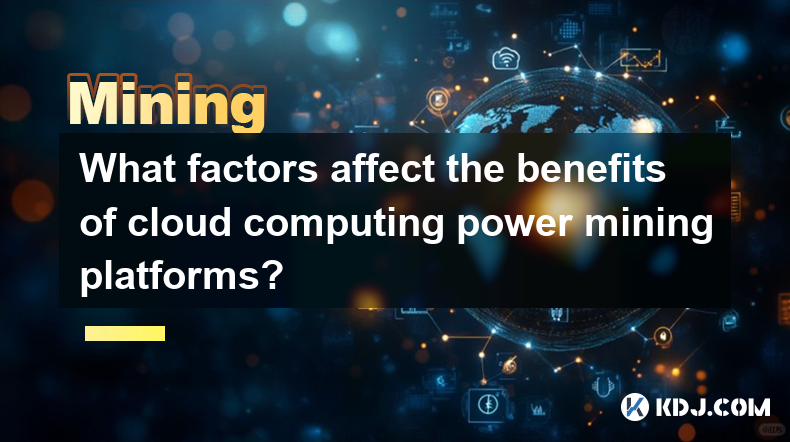
Key Points:
- Hashrate Distribution: Uneven hashrate distribution across mining pools impacts profitability.
- Electricity Costs: Energy consumption is a major expense, significantly impacting profitability.
- Mining Difficulty: Increasing difficulty reduces rewards per unit of computing power.
- Cryptocurrency Price Volatility: Price fluctuations directly affect the value of mined cryptocurrency.
- Platform Fees: Commission structures and hidden fees can eat into profits.
- Hardware Performance and Maintenance: Efficient hardware and consistent maintenance are crucial.
- Security and Reliability: Platform stability and security against attacks are vital for consistent mining.
- Regulatory Environment: Legal frameworks and taxes influence profitability.
- Pool Selection: Choosing the right mining pool can affect payouts and efficiency.
- Algorithm Changes: Changes in the cryptocurrency's mining algorithm can render existing hardware obsolete.
What Factors Affect the Benefits of Cloud Computing Power Mining Platforms?
Cloud computing power mining platforms offer a convenient way to participate in cryptocurrency mining without the need for significant upfront investment in hardware. However, several factors can drastically affect the profitability and overall benefits derived from these platforms. Understanding these factors is crucial for making informed decisions and maximizing returns.
Hashrate Distribution and Pool Selection:
The distribution of hashrate (computing power) across different mining pools significantly impacts profitability. Large, centralized pools often offer higher chances of frequent block rewards but may also lead to reduced individual payouts due to competition. Smaller pools may offer a better chance of solo mining rewards, but this comes with increased risk and variability. Choosing a reliable and efficient pool is paramount. Consider factors like pool fees, payout methods, and the pool's overall hashrate before joining.
Electricity Costs and Energy Efficiency:
Electricity consumption is a dominant factor in mining profitability. Cloud mining platforms often advertise low electricity costs, but it's essential to scrutinize these claims. Hidden fees or unexpected increases in energy charges can quickly erode profits. The platform's overall energy efficiency, measured by the amount of cryptocurrency generated per unit of electricity consumed, is crucial for maximizing benefits.
Mining Difficulty and Cryptocurrency Price Volatility:
The mining difficulty, a measure of how computationally intensive it is to mine a block, constantly adjusts based on the network's total hashrate. An increase in difficulty reduces the likelihood of finding a block and earning rewards. Similarly, the price volatility of the cryptocurrency being mined significantly impacts profitability. A sharp price drop can negate any profits generated, while price appreciation can enhance the return on investment.
Platform Fees and Hidden Costs:
Cloud mining platforms charge fees for their services. These can include setup fees, maintenance fees, transaction fees, and even withdrawal fees. Carefully review the platform's fee structure to understand the total cost. Hidden fees are common, so it's advisable to thoroughly research the platform's terms of service before committing. Compare fees across different platforms to identify the most cost-effective option.
Hardware Performance and Maintenance:
While cloud mining eliminates the need for personal hardware, the platform's underlying hardware performance and maintenance are critical. Outdated or poorly maintained hardware can significantly reduce mining efficiency. Look for platforms that utilize state-of-the-art equipment and have robust maintenance protocols. Regular updates and technological advancements in mining hardware are crucial to sustain profitability.
Security and Reliability of the Platform:
The security and reliability of the chosen cloud mining platform are paramount. Platforms vulnerable to hacking or downtime can result in significant losses. Choose platforms with a proven track record, robust security measures, and a history of uptime. Research the platform's reputation and read reviews from other users to gauge their reliability and security.
Regulatory Environment and Taxation:
The legal and regulatory environment surrounding cryptocurrency mining varies across jurisdictions. Taxes on mining profits, licensing requirements, and other legal considerations can significantly impact profitability. Understand the applicable laws and regulations in your region before engaging in cloud mining. Seek professional tax advice if necessary to ensure compliance.
Algorithm Changes and Technological Advancements:
Cryptocurrencies often undergo algorithm changes to enhance security or efficiency. These changes can render existing mining hardware obsolete, impacting the profitability of cloud mining platforms. Choose platforms that adapt quickly to technological advancements and upgrade their hardware accordingly to stay competitive.
Common Questions:
Q: Are cloud mining platforms always profitable?
A: No, cloud mining profitability is highly dependent on the factors mentioned above, including cryptocurrency price, mining difficulty, electricity costs, and platform fees. Profits are not guaranteed, and losses are possible.
Q: How do I choose a reputable cloud mining platform?
A: Thoroughly research the platform's reputation, security measures, fee structure, and customer reviews. Look for platforms with transparent operations and a proven track record.
Q: What are the risks associated with cloud mining?
A: Risks include platform scams, price volatility of cryptocurrencies, changes in mining difficulty, and unexpected increases in electricity costs. There's also a risk of the platform going bankrupt or experiencing downtime.
Q: What is the role of hashrate in cloud mining profitability?
A: Higher hashrate generally leads to increased chances of finding and mining blocks, resulting in higher potential profits. However, increased hashrate also increases competition within the mining pool.
Q: How do electricity costs affect cloud mining profits?
A: Electricity is a major expense in mining. Higher electricity costs directly reduce profits, while lower costs increase profitability. It's crucial to consider the platform's electricity costs and efficiency.
Disclaimer:info@kdj.com
The information provided is not trading advice. kdj.com does not assume any responsibility for any investments made based on the information provided in this article. Cryptocurrencies are highly volatile and it is highly recommended that you invest with caution after thorough research!
If you believe that the content used on this website infringes your copyright, please contact us immediately (info@kdj.com) and we will delete it promptly.
- "Cardano (ADA) Price Could Dip Below $0.60, Following Previous Market Cycle"
- 2025-04-09 05:10:12
- BONK, the well-known meme coin, has risen over 35% in the last week, attracting meme coin investors in the market. So, what caused this rally?
- 2025-04-09 05:10:12
- Bitcoin (BTC) Investors May Not Exactly Feel It, but BTC Has Been a Relatively Good Bet
- 2025-04-09 05:05:12
- Donald's Bitcoin (DONBTC) Could Turn Early Investors into Multi-Millionaires, Like Shiba Inu (SHIB) and Dogecoin (DOGE) Did
- 2025-04-09 05:05:12
- 6 Upcoming Kraken Listings That Could Be the Next Big Thing in Crypto
- 2025-04-09 05:00:13
- COTI Unveils New Privacy-Focused Blockchain to Reshape Web3 Transactions
- 2025-04-09 05:00:13
Related knowledge
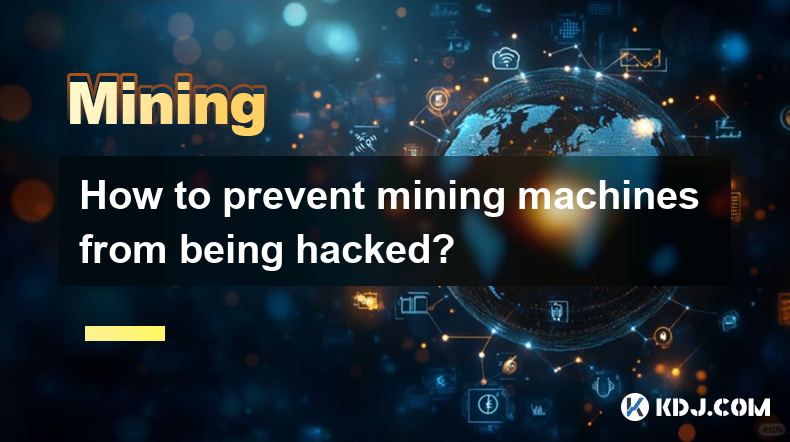
How to prevent mining machines from being hacked?
Apr 08,2025 at 09:00pm
In the world of cryptocurrency, mining machines play a crucial role in securing networks and validating transactions. However, these machines are also prime targets for hackers looking to exploit vulnerabilities for financial gain. Preventing mining machines from being hacked requires a multi-faceted approach that includes robust security measures, regu...
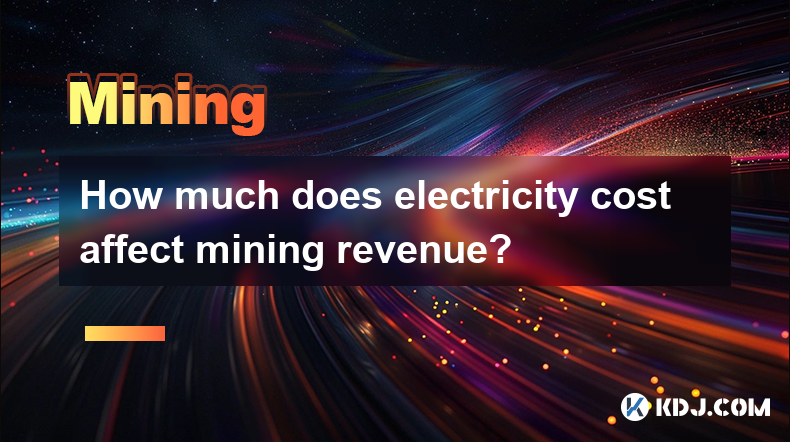
How much does electricity cost affect mining revenue?
Apr 08,2025 at 05:29pm
The cost of electricity plays a crucial role in determining the profitability of cryptocurrency mining. Mining revenue is directly impacted by the expenses incurred in running mining equipment, with electricity costs often being the most significant operational expense. Understanding how electricity costs affect mining revenue is essential for miners lo...
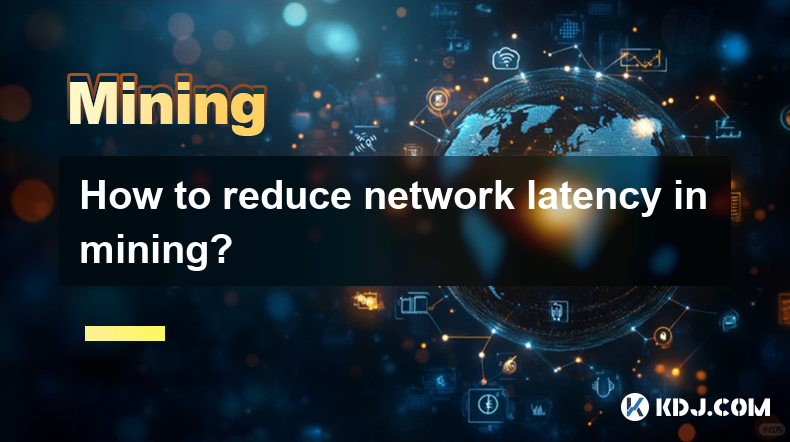
How to reduce network latency in mining?
Apr 09,2025 at 02:28am
Understanding Network Latency in MiningNetwork latency is a critical factor in the world of cryptocurrency mining. It refers to the time it takes for data to travel from its source to its destination across a network. In mining, lower latency can mean the difference between successfully adding a block to the blockchain and missing out on the reward. Red...

What is hashrate fluctuation?
Apr 08,2025 at 08:08pm
Hashrate fluctuation refers to the changes in the total computational power used by miners to process transactions and secure the blockchain network. This metric is crucial in the cryptocurrency world, particularly for networks like Bitcoin, Ethereum, and others that rely on proof-of-work (PoW) consensus mechanisms. Understanding hashrate fluctuation is...
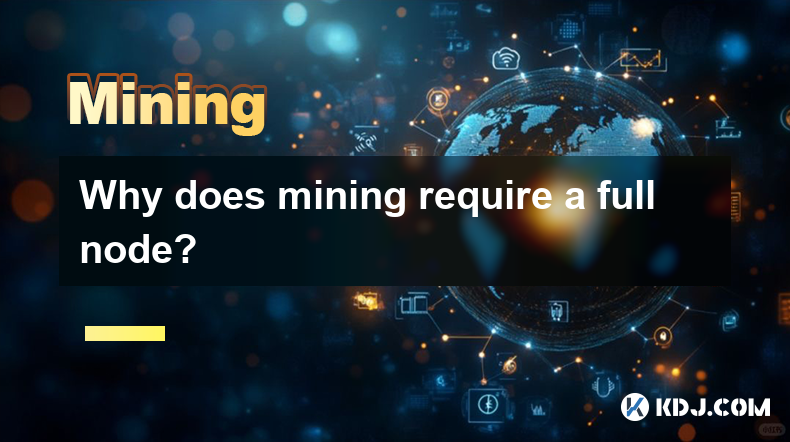
Why does mining require a full node?
Apr 08,2025 at 06:49pm
Mining in the cryptocurrency world is a complex process that involves verifying transactions and adding them to the blockchain. One of the key components required for mining is a full node. But why is a full node necessary for mining? Let's delve into the reasons and explore the intricacies of this requirement. What is a Full Node?A full node is a progr...
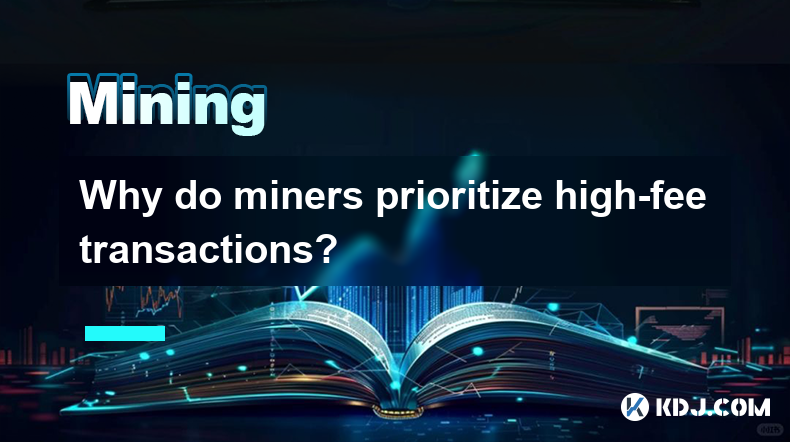
Why do miners prioritize high-fee transactions?
Apr 08,2025 at 05:01pm
Miners in the cryptocurrency ecosystem, particularly in networks like Bitcoin, play a crucial role in validating and adding transactions to the blockchain. One of the key factors that influence their decision-making process is the transaction fee associated with each transaction. Miners prioritize high-fee transactions primarily because these fees direc...

How to prevent mining machines from being hacked?
Apr 08,2025 at 09:00pm
In the world of cryptocurrency, mining machines play a crucial role in securing networks and validating transactions. However, these machines are also prime targets for hackers looking to exploit vulnerabilities for financial gain. Preventing mining machines from being hacked requires a multi-faceted approach that includes robust security measures, regu...

How much does electricity cost affect mining revenue?
Apr 08,2025 at 05:29pm
The cost of electricity plays a crucial role in determining the profitability of cryptocurrency mining. Mining revenue is directly impacted by the expenses incurred in running mining equipment, with electricity costs often being the most significant operational expense. Understanding how electricity costs affect mining revenue is essential for miners lo...

How to reduce network latency in mining?
Apr 09,2025 at 02:28am
Understanding Network Latency in MiningNetwork latency is a critical factor in the world of cryptocurrency mining. It refers to the time it takes for data to travel from its source to its destination across a network. In mining, lower latency can mean the difference between successfully adding a block to the blockchain and missing out on the reward. Red...

What is hashrate fluctuation?
Apr 08,2025 at 08:08pm
Hashrate fluctuation refers to the changes in the total computational power used by miners to process transactions and secure the blockchain network. This metric is crucial in the cryptocurrency world, particularly for networks like Bitcoin, Ethereum, and others that rely on proof-of-work (PoW) consensus mechanisms. Understanding hashrate fluctuation is...

Why does mining require a full node?
Apr 08,2025 at 06:49pm
Mining in the cryptocurrency world is a complex process that involves verifying transactions and adding them to the blockchain. One of the key components required for mining is a full node. But why is a full node necessary for mining? Let's delve into the reasons and explore the intricacies of this requirement. What is a Full Node?A full node is a progr...

Why do miners prioritize high-fee transactions?
Apr 08,2025 at 05:01pm
Miners in the cryptocurrency ecosystem, particularly in networks like Bitcoin, play a crucial role in validating and adding transactions to the blockchain. One of the key factors that influence their decision-making process is the transaction fee associated with each transaction. Miners prioritize high-fee transactions primarily because these fees direc...
See all articles






















































































